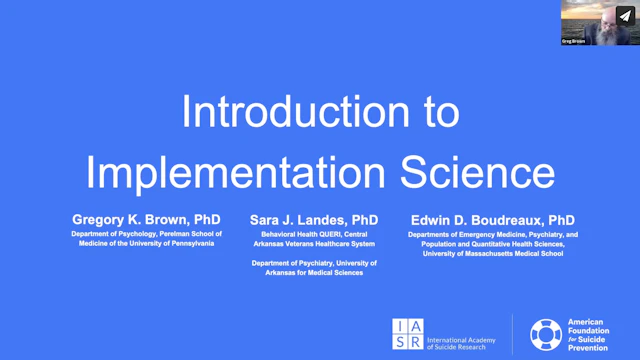Apply for an AFSP Research Grant
Research Grant Types
AFSP Research Resources

Research funding opportunities and resources
Find resources for those who apply for and receive grants in suicide research from AFSP and the larger research community.

AFSP-Funded Research Grants
Much of what is known about suicide comes from studies that AFSP has funded. Our studies open up new areas of inquiry, and our council of scientific advisers helps set the national research agenda.

Researcher Trainings and Roundtables
Video presentation trainings and other topics of interest to the suicide research community.

What We're Learning from Research
Discover the top findings from suicide research.

Publications from our Research
The following are publications that acknowledge the support of AFSP's research grants divided by year of publication.

Participate in Research
Learn how to contribute to suicide prevention research by volunteering for a study.
Research funding opportunities and resources
Suicide research priority areas
We define priorities for funding every two years to stimulate research in understudied areas. We also encourage applications that address the priorities set out by the National Action Alliance for Suicide Prevention’s Research Prioritization Task Force. Priority area research applications are reviewed along with the general pool of grant applications, with priority given to strong grants in the designated areas.
AFSP suicide research grants program priority areas for 2024–2026
- Ethnic and Racial Diversity: Suicide prevention research related to ethnic and racial underrepresented communities, health and mental health disparities and inequities, as well as researchers from underrepresented ethnic and racial backgrounds proposing research focused on understanding and preventing suicide.
- Understudied populations with elevated suicide rates: Some groups of individuals (e.g., those experiencing interpersonal violence, minoritized gender identity and sexual orientation groups, people with disabilities) and in some settings (e.g., correctional settings, foster care, and construction industry) have been found to have higher rates of suicide and yet they have not been well studied. We welcome proposals that seek to understand and prevent suicide in these types of populations and/or settings.
- Survivors of Suicide Loss: Research related to survivors of suicide loss, understanding the impact of suicide loss and its after-effects, and the process of healing.
We aim to fund at least one to two rigorously designed priority area grants among those awarded in each cycle. Our two-year priority period allows for resubmission of unsuccessful applications in the second year. While we encourage applications in these priority areas, we also encourage and welcome all applications related to preventing suicide.
The National Action Alliance for Suicide Prevention has defined its priorities in terms of six questions
- Why do people become suicidal?
- How can we better or optimally detect/predict risk?
- What interventions are effective? What prevents individuals from engaging in suicidal behavior?
- What services are most effective for treating the suicidal person and preventing suicidal behavior?
- What other types of preventive interventions (outside health care systems) reduce suicide risk?
- What new and existing research infrastructure is needed to reduce suicidal behavior?
The full text of the alliance’s priorities is available here.
Supplemental applications
We welcome applications that supplement to a larger, already funded grant. Such applications would be considered if they add to our understanding and prevention of suicide. For example, adding a group with a recent history of suicidal behavior or loss to suicide are encouraged.
Eligibility
AFSP Suicide Research Grants support studies aimed at increasing our understanding of the causes of suicide and factors related to suicide risk, or that test treatments and other interventions designed to prevent suicide. At least one suicide outcome measure must be included in all grant projects. We also consider studies of treatment feasibility, and studies that add a suicide component (e.g., population or treatment) to an existing grant in another area.
Grant Period
AFSP grants are awarded for 2-year periods with the exception of Pilot Research Grants and Focus Grants.
Eligible Applicants
Investigators from all academic disciplines are eligible to apply, and both basic science and applied research projects will be considered, provided that the proposed study has an essential focus on suicide or suicide prevention.
A current grantee may submit a new application as their grant nears completion but it will not be funded until completion of the current grant and submission of a Final Report.
New grantees must begin their studies within 6 months of the approved start date. Failure to begin the study within this time frame may result in withdrawal of the grant award.
Exclusions
Grant applications are not accepted from for-profit organizations, or from federal or state government agencies. Applications from the Veterans Administration are eligible.
Resubmission
For each annual grant cycle, all award decisions made by AFSP are final and not subject to revision or appeal. However, if your application is not funded, you may resubmit your grant application up to two times after your initial submission. AFSP strongly encourages resubmission. If you decide to resubmit please include a letter outlining your consideration of the feedback provided on previous applications.
Grantee Expectations
AFSP expects funded investigators to assist us with the important task of disseminating new research findings. In particular, we aim to disseminate findings to our constituents and donors who generate financial support for our research grants program. Following grant completion, we may invite you to present your study results at an AFSP-sponsored research forum, and expect you to provide us with periodic updates on your publications and research projects. Acceptance of AFSP grant funding assures your place in a growing community of suicide prevention researchers, and we appreciate your willingness to play an active role in that community, and in assisting us to communicate with our constituents.
Applicants should carefully review AFSP’s grant policy statements for additional guidelines and restrictions. Grant applications that do not conform to our stated policies will not be reviewed.
Assessing for Gender Identity & Sexual Orientation
Survey data suggest that individuals who are LGBT are at greater risk for suicide attempts (Haas, Eliason et al. 2011). However, confirmation of this finding is needed across a wider range of samples and using a wider range of data collection methods. In an effort to learn more about this issue we suggest that all AFSP-funded researchers who are collecting original data systematically assess research participants for sexual orientation and gender identity. Recommended methods of assessment can be found in the policy manuals. It is designed to serve as a model for federal agencies and other funders of mental health and suicide research. Click here for full guidelines.
Application Review Process
Click here for more information about our application review process.